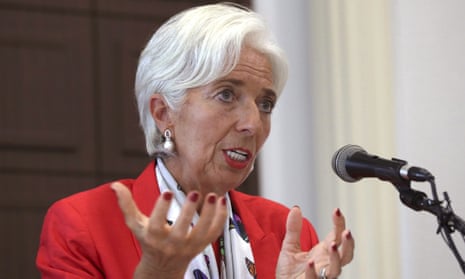The International Monetary Fund has said the global economy’s recent recovery may not last, despite a pickup in activity in all western countries except the UK.
Marking the 10th anniversary of the onset of the financial crisis, the IMF said in its World Economic Outlook (WEO) there was a risk that governments could be lulled into a false sense of security by booming markets and policymakers needed to guard against complacency.
Maurice Obstfeld, the IMF’s economic counsellor, cited high asset prices, rapid credit growth in China, political turmoil in Catalonia and a cliff-edge Brexit as risks to an improving global outlook.
Obstfeld welcomed the speech made by Theresa May in Florence last month in which she said Britain was seeking an implementation period of about two years after the formal date for leaving the EU in March 2019.
“We very much hope these negotiations can be constructive and minimise the costs to both sides”, Obstfeld said. “That is in everybody’s interest. A cliff-edge Brexit without any formal arrangements would lead to a lot of uncertainty.”
The UK’s growth forecast has been cut by 0.3 points to 1.7% since April as a result of the consumer-led slowdown in activity in the first half of the year, caused by the pound’s depreciation.
There has been no change in the outlook since the WEO was updated in July and forecasters at the National Institute for Economic and Social Research, a UK thinktank, said they expected growth to pick up from 0.3% to 0.4% in the third quarter of 2017.
After warning strongly about the risks of a Brexit-induced recession in the run-up to the EU referendum in June 2016, the IMF adopted a more cautious note in the WEO.
“The medium-term growth outlook [for the UK] is highly uncertain and will depend in part on the new economic relationship with the EU and the extent of the increase in barriers to trade, migration and cross-border financial activity,” it said.
Six months ago, the IMF predicted that in 2022 the UK would grow by 1.9% but in the expectation that any form of Brexit will be negative for the economy it has now trimmed that forecast to 1.7%.
Overall, the IMF said global output growth would increase from 3.2% in 2016 to 3.6% this year and 3.7% in 2018. It upgraded its growth forecast by 0.1 percentage points for this year and next from the last full WEO in April and the update to its forecasts in July.
Obstfeld said the state of the world economy was markedly different from 18 months ago, when there was the prospect of stalling growth and financial turbulence.
“The picture now is very different, with accelerating growth in Europe, Japan, China and the United States,” he said, noting that financial markets did not expect higher interest rates in the US or the phasing out of stimulus by the European Central Bank to cause trouble.
“These positive developments give good cause for greater confidence, but neither policymakers nor markets should be lulled into complacency,” Obstfeld said.
“A closer look suggests that the global recovery may not be sustainable. Not all countries are participating, inflation often remains below target, with weak wage growth, and the medium-term outlook still disappoints in many parts of the world.
“The recovery is also vulnerable to serious risks. Financial markets that ignore these risks are susceptible to disruptive repricing and are sending a misleading message to policymakers.
“Policymakers, in turn, need to maintain a longer-term vision and seize the current opportunity to implement the structural and fiscal reforms needed for greater resilience, productivity and investment.”
Canada will be the fastest-growing G7 economy this year, at 3%, according to the WEO. The US (2.2%) and Germany (2%) are expected to be the next strongest performers, followed by the UK, France (1.6%) and Italy and Japan (both 1.5%).
Since April, the IMF has become less optimistic about Donald Trump’s ability to deliver a package of tax cuts and spending increases, and has trimmed its US growth forecast for 2018 by 0.2 points to 2.3%. The fund has revised its forecast for the eurozone up by 0.3 points to 1.9%.
Obstfeld said the backlash against globalisation, which had been stoked by stagnant wages and the loss of well-paid, middle-skill jobs, was one of the threats to the global economy. The IMF believes sustaining expansion will require policymakers to avoid protectionist measures and “do more to ensure that gains from growth are shared more widely”.

Comments (…)
Sign in or create your Guardian account to join the discussion